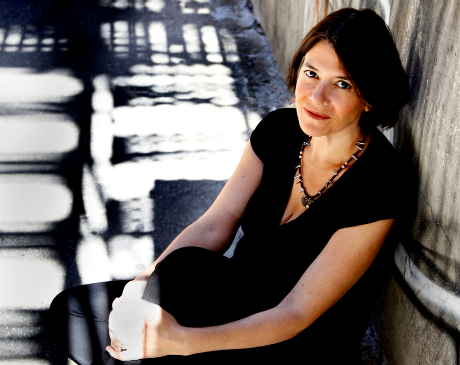In Their Own Words
Jennifer Michael Hecht's “The Spider”

The Spider
Spider, spider, spinning tight
against the darkness of the night,
what inspired geometry
is wonder at your web from me?
On what different leads or lies
could my sympathies arise
if, instead of these aspire,
I had but gone out there entire?
In the purpose of your art
twist the neurons of my heart.
For having lost a rhythm's beat,
I dread my hand and drag my feet.
What the knowing? What the chain?
In what furnace burns my brain?
Where's the Advil? What's to grab?
I've got your heartthrob in my bag.
When I'm the witness and the fears
fat and lean, bread, pills and tears,
and spider winding, watched by me.
And nature's this made all of we.
Spider, spider, knitting white
against the blackness of the night
what wacky-strange geometry
could frame our sweet-ass symmetry?
From Who Said (Copper Canyon Press, 2013). Reprinted with the permission of the author.
On "The Spider"
I took a photograph of a spider on August 27, 2011 from my kitchen door. While I was watching the spider this poem started in my head, "Spider, spider…".
The poem is what I call a "transliteration" —a meaningful sound-alike—of William Blake's classic poem, "The Tyger." I was in the middle of writing Who Said, my third book of poems, which is full of poems in direct conversation with an iconic poem. Many of them are also transliterations, or are other kinds of odd translations.
I have long thought about how poetry in other languages gets translated anew every generation, but the poetry of a given language, English here, does not get refreshed. (The exception is for pedagogical purposes and then it is usually crafted favoring clarity over art.) I let myself speak through a bunch of great poems in a variety of ways. There are short passages in some rewrites where I'm hewing close to the text and just gently modernizing, unencumbering the lithe and agile meter from the barnacles of time. I'm always also responding to the sound and meaning of the original poem. My mash-up of "When in the course of human events" and "When in disgrace with fortune and men's eyes" is about independence verses timeless loyalty.
"The Tyger" is one of those masterpieces that opens itself to a lot of interpretations, which Blake encouraged with its strange spelling (which was strange back then too). Some readers ask if there is even a real tiger in the poem. For me there has always been a real tiger in the poem. Whatever else it is up to, the poem is freaking out about the existence of this awesome, terrifying creature and marveling about the creative power and the moral choice that could have brought it into existence. What kind of workshop makes the demon cat's vivid fatal teeth, claws like warm knives, and keen strategic mind? "What the anvil, what the chain? In what furnace burnt thy brain?" And the most direct moral question is the poem's crescendo, when it asks the beast, "Did he who made the lamb make thee?" How could the source of love and dancing late-spring lambs also be the source of a blood-soaked beast and all the other mind-boggling brutality and death?
As a twenty-first century poet I have similar awe but different questions. Science has relieved us of myriad logical problems to do with this world having been created by a moral force. The creature that catches my eye and starts my mind rhyming kills not with force but with geometry. I am left to reconcile the idea that rationalist accidentalism manifests as creative and passionate. A geometry, of sorts, leads to all of this, my world and the spider's, all our planning for conquest, petty anguish, missed opportunity, physical itches, and empathy for flies.
I'm standing there, my attention enrapt by a splendid web that has been created just outside my kitchen door, between the wires that run overhead. The sky, for its own reasons, is purple that evening. I got some great shots of the web, but fell in love with this photo, showing Arachne herself, prowling towards her bundled prey. The spider and her patterned web hypnotize me because we are the same: patterns and instinct and cunning, our exalted science and art always also involved in death. Webs, molecules, networks. Isn't my wonder at the spider, in fact, the universe marveling at itself? It is true that the whole poem is also just my rage and ambivalence having a time of it through Blake's mad beats.


